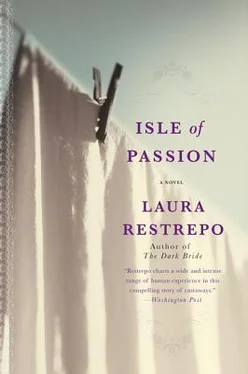“Did they attempt to poison him with marmalade?” I ask her. “Wasn’t it with soup?”
“With marmalade.”
“Where did they get the fruit and the sugar?”
“I don’t know, but Alta said it was with marmalade. My cousin’s bad luck started when she met Mrs. Alicia Rovira Arnaud at a hotel in Mexico City. That lady already had three children and was looking for a nursemaid to take to the isle when she realized that her chambermaid, Alta, was an educated person who worked there only because of the situation in which the Mexican Revolution had left her family. Our family. Alta’s father was a schoolteacher and had taught her to write with good spelling and good penmanship. They lived in Yautepec, state of Morelos, which was the zone of the rebel Emiliano Zapata and of the peasants in arms. The Quiroz family was running away from the fracas when they were almost killed in a shooting. Alta was saved by a soldier who galloped by, pulled her up onto his horse, and got her out of there. She never knew to what side he belonged. The family disbanded after leaving their home, and all had to fend on their own. Alta had to earn her living as best she could in the capital. She accepted the Arnauds’ offer, and when the family went back to Clipperton, she left with them. I suppose she did because it was her best prospect. She was fourteen years old and making five pesos a month. The Arnauds offered her ten and promised her that she would be on the isle only for four months and could return with the next ship. They were able to provide the double salary, but not her return in four months. Not that.
“Alicia and Altagracia were together in their predicament. One was the mistress and the other the servant, but fate treated them, I mean, mistreated them, equally. They were both forced to be Victoriano’s lovers, like all the other women in Clipperton. None was saved from that. He was the king and they were his slaves, and there were no privileges under this tyrant.
“But the more you suffer, the faster you get to heaven, and that was what happened to Altagracia. Heaven on earth, because when she returned from the isle, she met the German fellow again, who had never stopped looking for her, and they married. She had the good luck then of having an adoring husband who had established himself in Mexico in order to be with her, and who was totally devoted to her. He took her with him to live in the Water House in Acapulco, and since he always treated her like a princess, the local people called her ‘the Princess of the Water House.’
“So she never had to work again, Schultz put three servants and a gardener at her disposal. He bought her the best imported dresses and the most expensive shoes from incoming ships overflowing with merchandise. For her, mind you, who had been dressed in rags and had run barefoot for so long in Clipperton. Since she had been deprived of food, he gave her all the food she wished. It was usually German food, it’s true, like sausages and cabbage, which were the only things he liked, but she hid in the kitchen to prepare her Mexican mole or stuffed chiles, and shared them with the three servants and the gardener.
“That German fellow, Gustav Schultz, became the most beloved foreigner in Acapulco, because he was the one who brought drinking water to the port city. He probably did this to compensate her for all the thirst she suffered, and the many mouthfuls of seawater she had to swallow when it did not rain.
“I have always asked myself why Altita — that was how her husband called her — was able to inspire such love in a foreigner. Surely it was because of the way she was. There is no other explanation. She had a sweet but strong temperament, and he always liked to see her happy, in spite of all she had suffered. She was not pretty, we might say she was rather ugly. Her best feature was her precious hair. It was quite unusual. But in everything else she was quite ordinary. She was thickset, short, with peasant features, and I especially remember her fat fingers,” Guillermina tells me, looking wistfully at hers, so long and graceful, and she smiles when I tell her that it should have been the other way around, that she should have been the one named Altagracia, since she was so graceful, and her cousin, Guillermina.
“Alta told me many times about her life in Clipperton, without hate, without regrets. She did not mind her sad past anymore because her present was so happy. She would talk about it because she liked to reminisce. She lived to an old age and was a bit crazy, but she was happy. Her life was like a fairy tale, with a lot of suffering, but a happy marriage afterward. I cannot tell you any more, because I had a brain seizure that made me lose my memory,” Guillermina Yamada tells me once more, wringing her beautiful hands.

TAKING HER LAST CHANCE against death, Alicia climbed to the lighthouse to make signals to the approaching vessel. She heard voices coming from below, from the beach. The rest of the women had already seen the ship and were frantically shouting for help. If we all see it, she thought, then it must be real. While she was waving the sheet, the idea of a rescue became a real possibility. Her father, Orizaba, a school for the children, and so many ghosts that had become parts of an abandoned dream were suddenly taking substantial form again. Nobody could keep that ship from reaching the shore. The only thing to do was to pray for time to pass quickly, to precipitate the end without her having to go through the preliminaries: the wait that burned her throat, the smarting anxiety that made her eyes hurt. This time nobody could prevent it, it was enough to extend her arm to reach salvation. Nobody would stand in the way. Nobody.
Except Victoriano Alvarez. Like a vulture flying low and hitting her with its wing, the thought of Victoriano threatening to kill all of them before they could be rescued — so they couldn’t denounce him — jolted Alicia like a bolt.
She let herself go downhill, running without looking where she placed her feet, without stopping, and still struggling to keep her body wrapped in the sheet, getting up quickly every time she stumbled, without feeling the sharp rocks cutting her ankles, her legs, her knees. After reaching her three children, she untied Angel from the sling on her back, and laying him down on a safe spot, told her son Ramón:
“Now you stay here and keep an eye on the baby and on your sisters. We might be rescued, but we’ll have to do things very carefully. Swear to me, Ramoncito, that none of you are going to move away from here until I come back.”
She kept on going down without waiting for the child’s reply. I always climb this rocky cliff full of reasons to stop living, and I go down again full of reasons to keep on living, was what came to her mind as she descended, half running, half sliding. She saw Tirsa trying to light a bonfire on the beach, surely in order to make signals, and she called her, catching her voice, not daring to shout. Victoriano’s lair was on the other side of the rock, and he should be there if he was still sleeping. She was afraid the wind would carry their voices and wake him up.
“Tirsa,” she said when she got close to her, “we must kill Victoriano. Right now, before he kills us.”
“He wouldn’t dare, the boat is too close.”
“Yes he would, because he’s insane. He will shoot us, as he promised, and then he will hide, or he will leave, he alone. Let’s go, we have no time to waste.”
“How do we kill him?
“I buried Ramón’s sword next to the house—”
“No, we can’t use that. It has to be something we can hide so he doesn’t see it. We better hit him on the head with a rock.”
Читать дальше













